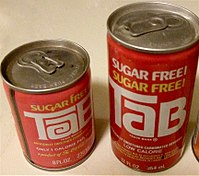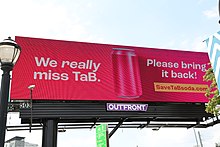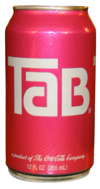Diet cola brand "TaB" redirects here. For other uses, see Tab.
 | |
 355ml can of Tab 355ml can of Tab | |
| Type | Soft drink |
|---|---|
| Manufacturer | The Coca-Cola Company |
| Country of origin | United States |
| Introduced | 1963; 61 years ago (1963) |
| Discontinued | December 31, 2020; 3 years ago (2020-12-31) |
| Color | Caramel |
| Flavor | Diet cola |
| Variants | Tab Clear
|
| Related products | Diet Coke |
| Website | us |
Tab (stylized as TaB) was a diet cola soft drink produced and distributed by The Coca-Cola Company, introduced in 1963 and discontinued in 2020. The company's first diet drink, Tab was popular among some people throughout the 1960s and 1970s as an alternative to Coca-Cola. Several variations were made, including a number of fruit-flavored, root beer, and ginger ale versions. Caffeine-free and clear variations were released in the late 1980s and early 1990s.
Following studies in the early 1970s that linked saccharin, Tab's main sweetener, with bladder cancer in rats, the United States Congress mandated warning labels on products containing the sweetener. The label requirement was later repealed when no plausibility was found for saccharin causing cancer in humans.
Tab's popularity declined after the Coca-Cola company's introduction of Diet Coke in 1982, though it remained the best-selling diet soda of that year. Coca-Cola continued to produce Tab in the United States, though in considerably smaller quantities than its more popular mainstay beverages, such as Coca-Cola and Diet Coke. According to the company, three million cases of Tab were made in 2011, and the beverage retained a cult following. In 2006, a Tab-branded energy drink was released, though it used a different formula from the standard cola. Coca-Cola discontinued Tab at the end of 2020.
History
Tab was created in 1963 by Coca-Cola after the successful sales and marketing of Diet Rite cola, owned by The Royal Crown Company. Previously, Diet Rite had been the only sugarless soda on the market. Tab was marketed to consumers who wanted to "keep tabs" on their weight.
Coca-Cola's marketing research department used its IBM 1401 computer to generate a list of over 185,000 four-letter words with one vowel, adding names suggested by the company's own staff; the list was stripped of any words deemed unpronounceable or too similar to existing trademarks. Of a final list of about twenty names, "Tabb" was chosen, influenced by the possible play on words, and shortened to "Tab" during development. Packaging designer Robert Sidney Dickens gave the name the capitalization pattern ("TaB") used in the logo as well as creating a new bottle design for the soft drink.
For a time in the 1970s, Coca-Cola introduced six variety flavors of Tab (all of which were also sugar-free): Root Beer, Lemon-Lime, Ginger Ale, Black Cherry, Strawberry, and Orange. A caffeine-free version of the original Tab flavor was introduced in 1983, alongside caffeine-free versions of Coca-Cola and Diet Coke. Tab Clear, a caramel color-free version of Tab, was released in the United States in 1992, and subsequently in the United Kingdom and Japan. Tab Clear was discontinued in 1994.
In 2006, Coca-Cola introduced Tab Energy. Though it shares the Tab branding, its formula is entirely different from that of the standard cola: it is sweetened with sucralose and has a sour, tart flavor.
Saccharin safety debate

Tab was reformulated several times. It was initially sweetened with a mixture of cyclamate and saccharin. After the Food and Drug Administration (FDA) issued a ban on cyclamate in 1969, sodium saccharin was used as the beverage's primary sweetener.
Studies on laboratory rats during the early 1970s linked high volumes of cyclamate and saccharin with the development of bladder cancer. As a result, the United States Congress mandated that further studies of saccharin be performed and required that all food containing saccharin bear a label warning that the sweetener had been shown to cause cancer in laboratory animals. Despite this, Tab remained commercially successful and was the best-selling diet soda in 1982. In May 1984, Coca-Cola introduced Nutrasweet into the Tab formula, which alienated a significant portion of its market, and resulted in numerous consumer complaints regarding a perceived change in flavor.
In the absence of further evidence that saccharin caused cancer in humans, the substance was delisted in 2000 from the U.S. National Toxicology Program’s Report on Carcinogens; this led to the repealing of the warning label requirements for products containing saccharin. In December 2010, the United States Environmental Protection Agency removed saccharin from its list of hazardous substances.
Availability
Tab's popularity began to decline in 1982 with the introduction of Diet Coke, although Tab retained something of a cult following in the United States, where customers purchased about 3 million cases in 2008. In 2011, the Coca-Cola Company reported that it produced approximately 3 million cases of Tab that year (in contrast to 885 million cases of Diet Coke). John Sicher, editor of Beverage Digest, commented in 2013:
has pockets of popularity around the country. You see it on shelves in New York and a few other places. It certainly is not a brand you would find in most stores in the U.S. It has a small but devoted following. Coke is right to keep it available.

The product was also available in the United States Virgin Islands, the Southern African Customs Union, Norway (under the name Tab X-Tra), Canada, and Spain.
Tab was available in Australia in the 1960s to 1980s. It was also sold in the United Kingdom from the late 1970s to the mid 1990s.
As part of their efforts to scale back on under-performing brands during the COVID-19 pandemic, in October 2020, Coca-Cola announced that it was discontinuing Tab, along with Coca-Cola Life, Delaware Punch, Diet Coke Feisty Cherry, Northern Neck Ginger Ale, Diet Northern Neck Ginger Ale, Odwalla, and Zico.
As of June 2021, Tab was still available at Coca-Cola stores in Atlanta, Orlando, Las Vegas and select Georgia locations.
In 2021, a group of Tab soda fans created the Save Tab Soda Committee.
Variants
| Name | Year launched |
Notes | Picture | Ref. |
|---|---|---|---|---|
| Tab | 1963 | Original flavor. Sweetened with cyclamate-saccharin mixture upon release, but cyclamate was removed after 1969, and saccharin was the principal sweetener. In 1984, Nutrasweet was introduced to the formula. | 
|
|
| Tab Strawberry | 1970s | Strawberry flavored diet soda; sold for a time in the 1970s alongside other diet drinks using the Tab name. | ||
| Tab Lemon-Lime | 1970s | Lemon-Lime flavored diet soda; sold for a time in the 1970s alongside other diet drinks using the Tab name. This is a predecessor to Sprite Zero, by which it likely was replaced. | ||
| Tab Black Cherry | 1970s | Black-Cherry flavored diet soda; sold for a time in the 1970s alongside other diet drinks using the Tab name. | ||
| Tab Root Beer | 1970s | Sugar-free root beer; sold for a time in the 1970s alongside other diet drinks using the Tab name. | ||
| Tab Ginger Ale | 1970s | Sugar-free ginger ale; sold for a time in the 1970s alongside other diet drinks using the Tab name. | ||
| Tab Orange | 1970s | Sugar-free orange soda; sold for a time in the 1970s alongside other diet drinks using the Tab name. This is a predecessor to Fanta Zero, which was launched in the early 2000s. | ||
| Caffeine Free Tab | 1983 | Original Tab flavor without the caffeine. It was sold during the 80s and vanished soon after. | ||
| Tab Clear | 1992 | Clear diet cola. Was first sold in the U.S. and later to Australia, the UK and Japan, and was discontinued within a year. | ||
| Tab (Southern African Customs Union variant) | 1990s | In these countries, Tab uses a different recipe compared to Spain and the U.S., where it is a caffeine-free drink, and uses less carbonation. The areas this can be found are Botswana, Lesotho, Namibia, South Africa and Eswatini. | 
|
|
| Tab X-Tra | 1994 | A Norwegian version of Tab with a different name, made to compete with Pepsi Max in the country. It was also sold in Sweden and Finland, but the drink was discontinued in Sweden in 2007 and discontinued in Finland at an earlier date. After 2007, it was exclusively sold in Norway until it was discontinued in 2021. | ||
| Tab Energy | 2006 | A Tab-branded energy drink which uses an entirely different recipe from the cola. It was also sold in Mexico, New Zealand and Spain, where it is called Tab Fabulous. | 
|
References
- Walker, Andrea (July 7, 2005). "First there was Diet Rite, then Tab and Diet Pepsi. In 1982, Diet Coke arrived on the scene. Now, with Coke Zero, the latest entry on the market, it's a real..." The Baltimore Sun. Retrieved April 1, 2018.
- "Are Artificial Sweeteners Safe for People With Diabetes?". Cleveland Clinic. June 29, 2015. Archived from the original on October 2, 2016.
- ^ Belkin, Lisa (October 10, 1984). "Tab soda drinkers miss familiar taste". The New York Times. Retrieved April 1, 2018.
- ^ Truman, Cheryl (April 22, 2013). "TaB turns 50: Those Who Love the Fizzy Diet Cola Celebrate". Coca-Cola Company. Retrieved April 1, 2018.
- "PBS NewsHour Weekend Full Episode December 19, 2020" – via www.youtube.com.
- Siegel, Benjamin (June 2006). "Sweet Nothing—The Triumph of Diet Soda". American Heritage. Archived from the original on June 21, 2006.
- "Product Descriptions: Tab". The Coca-Cola Company. Archived from the original on June 26, 2012.
- ^ "Cult sodas with a history: Tab". Fortune. October 2009.
- Mead, Linda T. (2002). Investing With Giants: Tried and True Stocks That Have Sustained the Test of Time. John Wiley & Sons. p. 122. ISBN 978-0-471-27158-1.
- "The TaB bottle". Beach Packaging Design. November 29, 2012.
- ^ MeTV Staff (January 15, 2018). "In the 1970s, Coca-Cola also tried to expand its diet soda with a variety of Tab flavors". MeTV. Retrieved April 1, 2018.
- ^ Lueck, Thomas J. (April 29, 1983). "Coke Brands Join No-Caffeine Fray". The New York Times. Retrieved April 1, 2018.
- ^ Bhasin, Kim (June 6, 2012). "16 Failed Soda Brands You'll Never See Again". Business Insider Australia. Retrieved April 2, 2018.
- Bryant, Adam (December 15, 1992). "COMPANY NEWS; Coke Adds a Clear Cola To Its 'New Age' Stable". The New York Times. Retrieved April 1, 2018.
- ^ The Associated Press (January 19, 1993). "COMPANY NEWS; Tab Clear is introduced in Britain". The New York Times. Retrieved April 1, 2018.
- ^ Morford, Mark (March 8, 2006). "Tab Energy Kills You Dead / The famously toxic retro cola nails women with a new, pink energy drink. Because you love it". San Francisco Chronicle. Retrieved April 2, 2018 – via SFGate.
- ^ Lindop, Edmund (2009). America in the 1960s. Twenty-First Century Books. p. 50. ISBN 978-0-761-33453-8.
- "Artificial Sweeteners and Cancer". National Cancer Institute. August 18, 2005. Retrieved April 2, 2018.
- "Removal of Saccharin from the Lists of Hazardous Constituents and Hazardous Wastes under RCRA and from the List of Hazardous Substances under CERCLA". United States Environmental Protection Agency. Archived from the original on October 29, 2015.
- McGrath, Ben (February 6, 2006). "Tab Scare". The New Yorker. Retrieved April 2, 2018.
- Maloney, Jennifer (October 16, 2020). "Tab, Coca-Cola's Diet-Soda Pioneer and a '70s Icon, Is Going Away". The Wall Street Journal. Retrieved October 16, 2020.
- "Tab". us.coca-cola.com. Retrieved May 30, 2021.
- Francis, Ali (August 23, 2022). "For Tab superfans, bringing the soda back is personal". Bon Appétit. Retrieved February 18, 2023.
- "How much caffeine is in a Coca-Cola?". Coca-Cola Africa. Retrieved April 1, 2018.
We know that not everyone drinks caffeine and not everyone wants to drink it all the time, so we also offer a range of caffeine-free beverages, including TAB so people can make the choice for themselves and their families.
- "Aldri mer Tab X-tra". godt.no (in Norwegian Bokmål). November 1, 2021. Retrieved December 1, 2021.
- "TAB X-tra®". Coca-Cola Norway (in Norwegian). Retrieved April 1, 2018.
External links
- Ryan, Ted (February 7, 2013). "A Sweet Celebration: TaB Commemorates Golden Anniversary on Valentine's Day". Coca-ColaCompany.com. Archived from the original on February 16, 2013. Retrieved March 8, 2013.
| Varieties of Coca-Cola | ||
|---|---|---|
| Regular | ||
| Low-calorie | ||
| Other brands | ||
| The Coca-Cola Company | ||||||||||||||||||
|---|---|---|---|---|---|---|---|---|---|---|---|---|---|---|---|---|---|---|
| Brands |
| |||||||||||||||||
| Joint ventures |
| |||||||||||||||||
| Former holdings | ||||||||||||||||||
| Legal | ||||||||||||||||||
| Campaigns and slogans | ||||||||||||||||||
| Other | ||||||||||||||||||
| Diet drinks | |
|---|---|